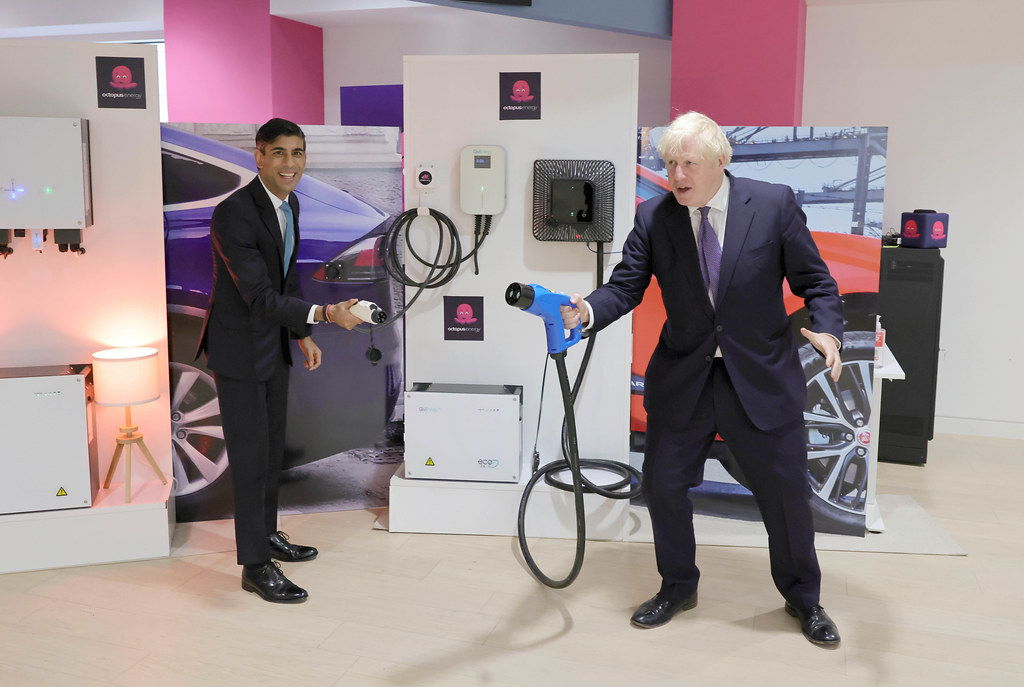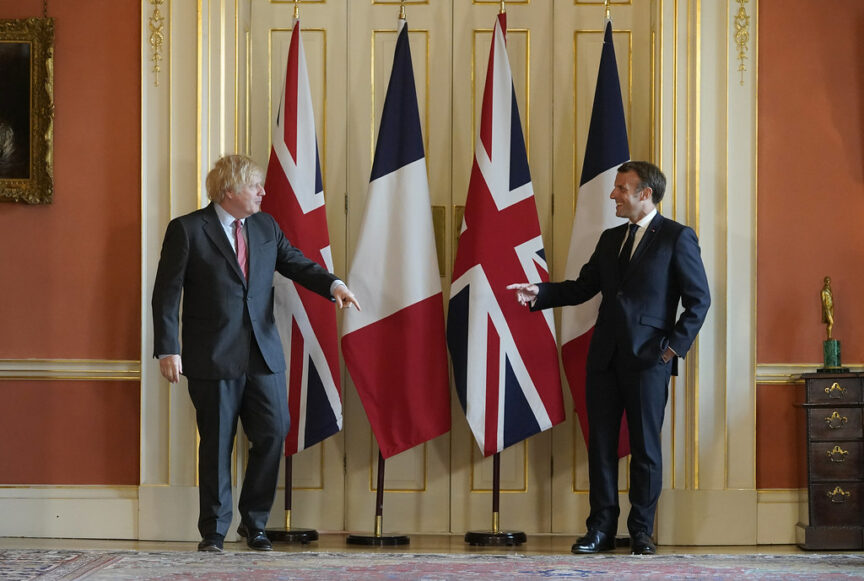Here’s an Easy Fix for the Cost of Living Crisis: Cut Bosses’ Profits
It's a fate worse than death for the big business-loving Tories.
by James Meadway
28 February 2022

The cost of living is rising at its fastest rate for 30 years, according to data from the Office for National Statistics. The government statisticians estimate that prices have increased by an average of 5.5%. But this figure disguises far bigger increases in the price of essentials like food and energy. The Bank of England (BoE) forecasts inflation will reach over 7% by April, pushed upwards by the government’s 54% increase in the price of energy for households.
This spike in domestic gas bills will arrive at the same time as the planned increase in national insurance contributions and council tax rises. And this was happening before the impact of Russia’s invasion of Ukraine began to play out. Oil prices have surged to more than $100 a barrel, whilst the price of natural gas in Europe shot up 62% in the first days of the Russian offensive. As sanctions begin to bite, and Russia’s trade in oil and natural gas is dented, further price spikes are likely.
How Russian invasion of Ukraine could impact on cost of living:
* Energy price cap could hit £3,000 in October
* Food prices could rise by 8.2% in April
* Petrol prices expected to rise to more than £1.70 a litre
— Steven Swinford (@Steven_Swinford) February 24, 2022
All of this culminates in households across Britain facing a dramatic squeeze in their living standards by Easter – the worst people will have experienced, in most cases, for many decades.
But paying workers less won’t solve the crisis, as BoE governor Andrew Bailey claimed recently. It will just mean most people’s finances are even more squeezed. Instead of cutting pay packets, it should be big companies’ profits – which official figures show are at an all-time high – that are taking the hit.
The government is doing nothing.
Far from being driven by workers demanding more money, these price hikes are the result of the after-effects of the Covid lockdowns disrupting supply, and environmental crisis, now joined by the impact of war. Gas prices across Eurasia have shot up over the last year. Food prices have been hit by extreme weather and droughts, which have damaged crops from Canada to Brazil. A nurse or a cleaner asking for more money in Britain will do nothing to change these realities.
Chancellor Rishi Sunak is attempting to absolve the government of responsibility in its management of the crisis by blaming these “global factors” over which, he claims, it has no control – the implication, then, being that workers and consumers must continue to pay for the crisis. But, of course, this isn’t true.
Financial Times columnist Martin Sandbu got to the heart of the issue when he asked: “Why does the governor of the Bank of England encourage restraint in wage demands but not call for restraint in businesses’ attempts to protect their profit margins?”
He’s absolutely right. We could be squeezing profits instead of pay. Plenty of companies can afford it – just look at Shell and BP, which made $40bn in profits last year. Ultimately, who pays for rising costs is a political decision; it could be bosses and their profits; it could be workers and their pay packets. Politics, not economics, is the determining factor.
France is limiting energy prices.
A cursory glance at what has happened to energy prices elsewhere in Europe confirms this. In Britain, gas prices are set to rise by 54% in April. A typical household will be looking at an extraordinary £700 increase in its energy bill for the year. France, by contrast, has pledged to limit energy price rises to 4%.
Some socialists claim that France was able to limit electricity price rises because its main power company, EDF Energy, is part-nationalised. But this isn’t the real reason the French government moved so quickly. EDF is a massive profit-generating business, currently being “restructured” by the government in what unions fear is a precursor to full privatisation. EDF workers in France have struck repeatedly against the plans over the past year, whilst their counterparts in Britain launched a strike last September in a dispute over pay. In this way, EDF’s behaviour is indistinguishable from other big capitalist enterprises.
So, it isn’t being publicly owned that has led EDF to cap domestic energy price rises; nor is it that French energy production is far more dependent on nuclear power than the UK. Nuclear power prices have risen (if by less than gas) over the last year, and so these and other rising costs are still expected to mean the cap on domestic energy prices will see EDF lose €8bn.
The real reason behind the French government’s response then is that it lives in fear of a second round of the so-called gilets jaunes protests, which saw hundreds of thousands of people take to the streets in every part of France, initially against the rising costs of petrol.
The French prime minister cancelled a planned rise in petrol taxes in December 2018 as a result of the protests. However, unrest against the broader rise in the cost of living continued throughout 2019, halting only because of the coronavirus pandemic. It is this fear of the protestors’ return to the streets that is driving the French government to try to strictly control the price of household energy.

On the other side of the Channel, it is the Tories’ lack of fear of such dissent that is making them so blasé. If the government wanted to halt the rise in energy costs due in April, it could do so, with no need to nationalise anything beforehand: the price paid by domestic gas customers is determined by the regulator, Ofgem, which is charged by the government with setting the price cap every six months. Ofgem’s decision to radically increase the price of domestic energy is one taken to protect the profits of energy suppliers at the expense of millions of households. It should not go ahead, and a basic demand for the movement should be to halt the increase.
Of course, in doing this, some of the smaller energy companies, lured into the market in the early 2010s by the Tories, will not survive. That said, one of them, Bulb Energy, has already been brought into public ownership by the business secretary in order to protect its customers’ energy supplies. The law is in place to allow such nationalisations to happen quickly and easily. It could act as the model approach for the crisis, as this Bulb worker has argued. Ultimately, the whole privatised gas industry should be brought back into public ownership.
Halt gas price rises, now.
The immediate demand, however, has to be to halt the gas price rise today. Labour should be calling for this. However, Keir Starmer, in his response to the government’s statement on the Ukraine emergency last week, pledged that “the British people have always been willing to make sacrifices” in the event of higher prices and economic dislocation from the war.
Whatever the intention, this risks handing the government and big business a blank cheque for future price rises. It means any future price hike in gas or oil or some other essentials – or perhaps even future tax rises – can be justified by reference to the war in Ukraine. But if some companies are making fat profits from these high prices, they are essentially profiteering from the crisis. In this context, the British public should not be paying a single penny more to companies like BP.
If Labour won’t take action on this, it will be up to activists to defend the standard of living in Britain. Demonstrations by the People’s Assembly, which took place up and down the country earlier in February, are a start – but only a start. As the crunch worsens over the next few months, a new movement must take up the challenge. Linking up with workers demanding pay rises will be important, as well as rubbishing the idea that price rises for the 99% are natural or inevitable.
After all, it’s not only the French who know how to protest. Britain has its own, centuries-long tradition – from the peasants’ revolt to the poll tax – of righteous protest in defence of an acceptable standard of living for ordinary people. It’s high time we resurrect it.
James Meadway is an economist.


